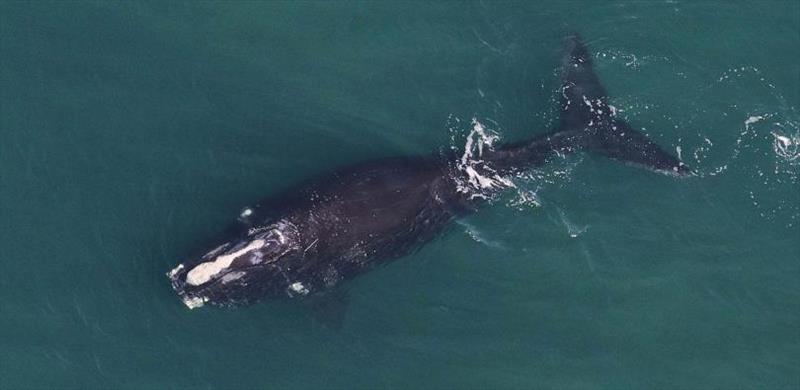
Announcing $500,000 in new support to help conserve North Atlantic right whales
by National Fish and Wildlife Foundation 21 Nov 2020 14:13 UTC

North Atlantic right whale © NFWF
The National Fish and Wildlife Foundation (NFWF) today announced nearly $500,000 in investments to reduce threats to North Atlantic right whales and other marine life off the coast of New England. These critical investments include $427,000 in grants and $71,000 in grantee matching contributions.
The grants were awarded through the Electronic Monitoring and Reporting Grants Program and the Fishing for Energy Program. NFWF is working in partnership with Shell and NOAA to provide funding to support gear advancement and to improve the region's ability to transition to on-call gear that does not require a buoy-line.
Marine animals such as right whales can become entangled in lines used to mark the location of fishing nets or traps in the ocean. Innovative technology can offer a viable alternative to track gear while reducing risks to whales.
"NFWF is able to bring a comprehensive approach to right whale entanglement through two programs that focus on sustainable fishing," said Jeff Trandahl, executive director and CEO of NFWF. "These two projects will help identify socioeconomic and other considerations of implementing new standards throughout the region, while at the same time continuing to refine the technical aspects of this gear innovation that holds so much promise for improving the future for North Atlantic right whales."
"NOAA Fisheries has a dual responsibility to maintain sustainable fisheries and conserve protected species such as the North Atlantic right whale," said Chris Oliver, NOAA Fisheries Assistant Administrator. "We are working with a strong coalition of partners, including fishermen, to make investments and find solutions to reduce the entanglement threat fishing gear poses to this iconic species."
"Shell is a proud and active member in the communities where we operate," said James Cotter, Shell's General Manager Americas of Offshore Wind. "We look forward to building on our partnerships with NOAA and NFWF to further innovate technology that enhances the sustainability of our oceans and leads to the conservation of the North Atlantic right whale."
The Electronic Monitoring and Reporting Grant Program seeks to advance NOAA's sustainable fisheries goals to partner with fishermen, stakeholders, state agencies and others to systematically integrate electronic technology into fisheries management, including modernizing systems to support implementation and use of these technologies. The Fishing for Energy program works to reduce the amount of derelict fishing gear in and around our coastal waterways by supporting strategies to reduce the impacts of derelict fishing gear to marine and coastal environments and navigational safety.
The projects supported by the two grants announced today will advance the development and implementation of innovative gear tracking technology:
Grant: Developing a framework for ropeless fishing in New England
Grantee: Massachusetts Division of Marine Fisheries
Total project budget: $201,207
Grant description: Characterize the issues and challenges associated with the integration of on-call or ropeless fishing gear technology into New England fisheries. Project will evaluate the issues using semi-structured interviews and workshops with experts in the field, synthesize perspectives, and analyze the technical, legal, and socio-economic challenges and opportunities to develop a set of recommendations for further work. This project is funded through the Electronic Monitoring and Reporting Grants program.
Grant: Reducing entanglements of critically endangered marine life with gear tracking technology
Grantee: Blue Planet Strategies
Total project budget: $296,816
Grant description: Develop an innovative gear tracking technology to be tested in the New England groundfish fishery designed to track gear anchored at the sea floor to surface buoys. Project will reduce entanglement of critically endangered marine life, reduce the amount of derelict gear and advance gear tracking technology. This project is funded through the Fishing for Energy program.
For additional information about these two grant programs, visit the following links: